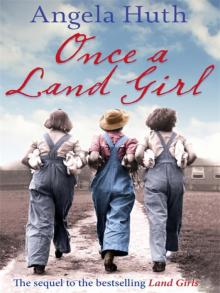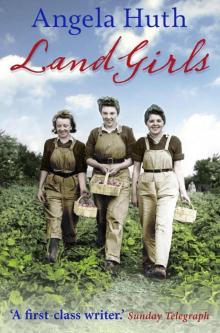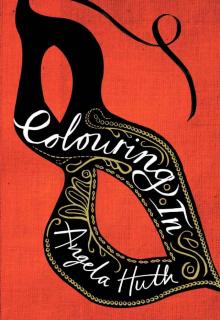- Home
- Angela Huth
South of the Lights Page 6
South of the Lights Read online
Page 6
‘Hello,’ she said.
Then she descended the rest of the stairs very fast, not looking at her feet, one hand holding up her skirt. Evans felt a brief sensation that this was all theatre: that in some mysterious way he was inextricably involved in the action on a stage. A waking dream.
She stood before him, surprisingly small now she was on the ground.
‘Who are you?’
‘Evans. Er, Evans Evans.’ The absurdity of his own name, when he was forced to give it, still caused Evans embarrassment. He clutched at the pockets of his raincoat. A small shower of water ran over his hands and added to the dark ring on the floor. ‘You know my mother, Rosie.’
‘Of course I know Rosie. She’s always talking about you. How can I help you?’
‘Well, as a matter of fact . . .’
‘The cricket match, the Boy Scouts or some sort of raffle? Let me guess.’
She moved over to the fire, smiling. Stood with her back to the flames, arms folded under her small breasts, clutching to herself a small shiver.
‘None of those things.’ Evans had to speak loudly against the music.
‘Then for goodness sake get rid of that soaking mackintosh and we’ll go next door and have a drink.’
‘Are you sure?’ Evans was already struggling out of the mackintosh. ‘I mean, it looks as if you’re expecting company. I’m sorry, I didn’t. . . a party?’
‘A party?’ Mrs Browne smiled again. Wistful this time. ‘Oh, no. I just like to keep things going. Come on.’
She went to a door at the corner of the hallway. Evans followed her. The room they entered at once infused him with an unfamiliar sense of warmth, of caring. He had no eye for detail, was only aware of impressions: high windows in two of the coral walls: round the fire a gathering of sofas and chairs that seemed to have been built for large people; ancestral portraits and spring flowers. The music was quieter in here.
‘Now, what will you have? Whisky? Let’s both have whisky, all this rain . . .’ She was moving about against the windows, swaying to the frail voice of the olden-days singer. Love me or leave me . . . Made bold by his part in the play, Evans sat down by the fire without asking. The well-stuffed back of the sofa eased him as no sofa had ever done before. He crossed his legs and stared at the oblong chunk of his thigh. In this radiant world of make-believe he felt curiously at home.
Mrs Browne handed him a drink. She sat opposite him, huddled into the corner of an armchair that was much too big for her, legs drawn up beneath her. Again the light from the windows behind her made her turbulent hair an almost colourless mass. Evans judged her to be about ten years older than Brenda. For her age, she wasn’t at all bad. Come to think of it, he remembered his mother having said just that on several occasions. He sipped the whisky. It was strong.
‘You’ve a very nice place, here,’ he said. Mrs Browne looked down into her drink. Pale eyelids. In a lull in the singing they could hear the splatter of rain on the windows. ‘I understand it’s all going to be sold,’ went on Evans. ‘That seems a pity.’
‘It’s on the market, but it will take a long time. Not many people want a house of this size these days.’ Something about the flatness of her voice made Evans realise the selling of the house was not a subject she wished to continue. ‘What is it that I can do for you?’
‘I had this funny plan. It came to me, sudden like, last night.’ Evans wondered if Mrs Browne was aware of the fact that she was making the unfolding of his plan surprisingly easy. Her very position among the cushions seemed sympathetic. ‘You see, it’s like this. I’ve got this girl, Brenda. Mum may have told you we’re engaged.’
‘Yes.’
‘Well, Brenda and me have been together two years now. We’re saving up for one of those houses on the new estate so that we can start our marriage in a decent place, as it were. Well, we’ve still got some time to go before we can manage the down payment. And as you can imagine, waiting, like, a long time, has its problems.’ Evans took another sip of the whisky, shifted his look from Mrs Browne to the rain beyond the windows. The warm room, with its outdoor smell of flowers, was protective in a way he had never previously experienced. Perhaps Mrs Browne had conjured this protection for herself, and was innocent of the effect it had upon her visitors. ‘The thing is, we’ve never had anywhere to go. To be alone, I mean. Brenda shares this flat with a friend called Lark. She’s a nice enough girl, but not a one for going out. She’s always there. She stays in her own room, very tactful, but it’s not the same as being alone, is it? Then of course at home – well, the house being that small, it’s always crowded with Mum and Dad.’
‘I see. So where do you go?’
‘Fields, barns. It gets on your nerves.’ Evans put his hand over his right eye, pretending to scratch his forehead. Then he allowed himself a slight smile. ‘It’s not what you’d call most comfortable, either.’
‘Quite.’ Mrs Browne smiled in return.
‘So this is what I was wondering. You here in this big house all alone, I thought. Maybe, I thought, you’d have a room, somewhere in the attics, we could rent . . . until the place was sold.’
Mrs Browne nodded immediately.
‘Of course,’ she said, quietly. ‘Of course. What a good idea.’
Evans noticed that the flames were growing brighter then, and his hand shook a little round his icy glass.
‘I could pay you a month’s rent in advance. We’d take good care of it, I can assure you that. We wouldn’t disturb you.’
Mrs Browne swung her legs to the ground with a quick, determined gesture. She was suddenly vivacious.
‘Of course you can have a room, but only on one condition: no money is involved.’
‘But, in that case, we couldn’t. . .’
‘You could. Don’t you see? No, I don’t see why you should.’ She stood up. ‘The thing is, I’d like to feel someone was in the house, upstairs, having . . . nice times again.’
Evans stood too. There was something about Mrs Browne that made him realise it was pointless to argue further now. He was determined to bring the subject up again, later; but at this moment of the charade it all seemed irrelevant.
‘Let’s go up there right now,’ said Mrs Browne. ‘I can show you what there is.’
Evans followed her upstairs to the attic floor. She led him along a dusky passage.
‘We ran out of money before we could do much up here,’ she was saying. ‘But at least it’s warm. You could have any of the rooms, but I think this one is best.’ She opened a door.
The room, by the standards of the Evans house, was large. It had a sloping ceiling and two casement windows. There was an ink-stained rug on the wooden floor, a brass double bed, and the shapes of other furniture under dust sheets.
‘There’s masses of stuff up here,’ said Mrs Browne. ‘You can have what you like.’
‘No, really, we could –’
‘Please. It would do the things good to be used again.’ She went to one of the casement windows. This time the rainy light caught her face, threw a violet shadow from her chin on to her neck. Again she hunched her shoulders and folded her arms beneath her breasts, a gesture that seemed to be a habit with her. The position of her small body, as she stood like that, indicated a melancholy that was not betrayed by her voice.
‘The garden is perfect for parties,’ she said. For a moment Evans was confused, wondering whether she assumed he and Brenda were the kind of people to throw garden parties. ‘We always planned to have one on this lawn. I’d had it all arranged to the last detail. We were going to have a merry-go-round down there, look – and gondolas on the pond by the field, and fireworks over the round pond, and a marquee covering the rose garden at the back. But it didn’t ever happen, of course. We hadn’t the money. And now it never will.’
Evans was aware of the stuffiness of the room. It was evident that the windows had not been opened for some time. Mrs Browne had the same thought: she struggled with the catch.
&nb
sp; ‘Here, let me.’ Evans was beside her. He opened the window with a strong push and a small flight of rain instantly blew in on them. Mrs Browne laughed.
‘That’s lovely! We’ll leave it open for a few days to air the place. It smells of dust.’
They remained by the window looking out at the dappled garden, the blossom on the bushes of May very white, the distant trees blousy with rain, the brickworks’ chimneys half-hidden in a tangle of cloud and smoke. Evans sensed that the end of the charade was near. He felt suddenly compelled to be inquisitive, even if his question might jeopardise the arrangements that had already been made.
‘Did you spend your life here giving parties, then?’
Mrs Browne disguised a sigh.
‘Oh, no. Nothing like that. I must be giving a very flippant impression. Most of the time both of us were working very hard. But we did like having lots of people here: they seemed to enjoy it. We had wonderful nights, dancing, singing, playing silly games – I expect Rosie may have told you. But that was only a small part of our lives, until the money ran out. Then it had to stop.’ She wiped a streak of rain from her cheek. ‘But I do remember the parties, I have to admit. I remember them, perhaps better than anything else, partly because of the peace when they were over. We loved it when the house was full of people and music and things. But then we loved it even better when it went back to being quiet, like this.’
She put her hand on the window ledge, wiped dust from it with her finger. They listened to rain on the roof. Near as he stood to her, Evans felt Mrs Browne was very remote. Not in a week in this room, imprisoned with her, could he touch her: she inspired in him no desire. He saw that some people might find her beautiful, but for him she was too self-contained. Everything about her suggested she needed nothing more than her house. She was friendly enough, generous, kind, but something of an enigma. And Evans had no time for enigmas. He preferred the instant, animal appeal of Brenda with her great warm body and wicked eyes. At the thought of Brenda, here in this room in that bed, the spell of Mrs Browne was broken for Evans. But as he followed her back downstairs to the drawing-room, he realised that in some curious way, as strangers sometimes are, he had been very close to her for a short while. The visit to her house, her private world in which ordinary things seemed to have been infused with some of her spirit, left him feeling that the indefinable magic he sometimes imagined could exist, did exist. It was a possibility. Mrs Browne had proved it.
Back in their seats by the fire she made practical suggestions.
‘You can have a key to the back door, and if you use the back stairs I’ll never know when you’re coming and going, which I’m sure you’d like best. You must let me know if there’s anything you want. In the meantime come up any time you want and get it all arranged. I’m here all the time.’
Evans had finished his whisky. Judging by the darkening windows it was getting late. He felt he ought to go.
‘Don’t you mind living in this huge house all by yourself?’ he asked.
‘Never for one moment. I like aloneness and it’s never lonely. Besides, I have to keep it going in case . . . Well, no, I suppose Hugh will never change his mind about selling it, or coming back. But I like to keep it as it was . . . until it finally goes.’
‘I’d go out of my mind,’ said Evans, ‘all alone in a place like this. I couldn’t take the silence.’ The unusually strong drink had speeded his words. ‘I wouldn’t know what to do with myself. It’d be quite spooky, I’d think, especially when those bloody church bells get going. If you don’t mind me asking, Mrs Browne, what do you do with yourself all day?’
‘Keep guard.’ She smiled.
‘I’ve never met a woman like you before. I mean, not even a type of woman.’
‘Would you like another drink?’
‘Don’t know whether I should. I ought to be getting back, oughtn’t I?’
Mrs Browne was a little hazy before him now, flitting about with glasses and ice. The room seemed full of shadows too hazardous to cross on his weak legs. He had never had a strong head when it came to drink.
‘Not unless there’s something special you have to do. And anyway, I’d like to hear a bit about Brenda.’
In the next two hours Mrs Browne listened almost without interruption to the frustrations of Evans’s life, his hopes, his ambitions, his love for Brenda. When he left, much confused by the act of putting on his damp mackintosh, he heard her urging him to return soon, too. As he walked unsteadily back down the drive he reflected, in a confused way, that his plan had gone better than he could ever have anticipated. A room at last, and a smashing room at that. It was nothing less than a triumph. Evans gave a celebratory leap over a shallow puddle which quivered with moonlight. Unnerved, he almost fell. Recovering himself, he set about thinking how and when to break the news to Brenda. First he needed sleep, time to recover his calm. Then, in the morning, if he woke to find it had not been a dream, he would make more plans. Probably it would be best to keep it from her until the room was quite ready. Then he would take her there – she’d never believe him till she saw it – and they would celebrate in the way they both liked best.
There were times, not more than twice a year, that Rosie and Henry had a row. In retrospect Rosie could never be certain of the superficial reason for these rows. For all the love, it seemed that some friction which they could never discuss cumulated over the months and burst out in a guise that was little to do with the real cause. The guise, in fact, was nearly always the same: the name of their son. This was a subject that had meant anguish from the time he had been conceived, and they had had their ritual fights about it ever since. These fights had never shifted their own particular convictions that the other one was wrong. When over, each went their own way, nurturing his own inarticulate hurt. For her part, Rosie would clutch at the physical pain in her ribs with her clumsy hands, shed a few quiet tears under the sheets, and begin the next day as if nothing had happened. This was not entirely due to stoicism. She believed that rows were something everyone had to go through, once in a while, and, like childbirth, when they were over their pain was impossible to recall. They did nothing to clear the air because the air, she believed, in the case of she and Henry, was devoid of tension, full of love, daily love. The occasional outbursts were no more serious than a rare storm, Rosie told herself, natural to the rhythm of things. They were of so little consequence that she divulged them to no one, did not muse upon them herself. She simply made sure they never took place when Evans was there.
But for all their unimportance, the unease of an impending row twisted into Rosie’s gut in a way that made her hands tremble and her mouth stiffen. She often thought that if it wasn’t for the rigidity of her mouth she could smile at Henry and thereby dissolve the situation before it really began: but the paralysis made this impossible. Impeded as she was, there was no alternative but to endure the fray, trying to remember it was not the real Henry and Rosie taking part, but devils within them temporarily escaped.
Back from her meeting, as soon as she opened the front door, Rosie knew what was going to happen. Henry’s mackintosh, hanging in its usual place, was wet. He had been out. It wasn’t his night for going to the Star, but she would make no issue of that. It was, however, a climax to the oppressive silence that he had lately inflicted upon them. As Rosie went into the kitchen a spasm drilled within her, and she saw her hands quiver with their own angry life.
‘Evans not back?’ she said. Henry put down his paper. He had guessed from her footsteps – they became staccato with an approaching storm – what was in store. Her tight face proved him right. In no mood for words tonight, the Leopard prancing in his mind, he made an effort to be flat.
‘It’s not late,’ he said. Then he made his mistake. ‘The Boy can come in when he likes, can’t he?’
Rosie slammed a string bag full of papers on to the table.
‘Evans!’ she shouted. ‘His name is Evans! For twenty-seven years – do I have to keep on tellin
g you? I registered him as Evans. He is Evans. It’s registered as Evans, do you understand?’ Henry saw the metallic sky through the window behind her. He heard the rain against the small panes, a gentle backing to her voice. ‘All his life you’ve referred to him as the Boy. He’s had to put up with it. I’ve had to put up with it. What sort of father are you, Henry Evans?’
‘I wanted my son to be Sinbad. I told you I wanted that, I told you at the time.’
‘Sinbad! Pah! You and your fancy notions about sailors, the Navy, the sea. What did you ever do at sea to make us proud?’
Rosie knew how best to goad her husband. Chide him about his naval career, and there was no hope of his remaining calm. He threw his paper to the ground, stood up.
‘Shut up, woman, will you? I want none of this tonight. What do you know about the Navy? What do you know about anything but keeping your petty little house?’ Rosie sat down, flayed. Henry had gone too far, attacking her house. ‘You’re the one who’s done the damage, take it from me. Lumbering the Boy with a name like that, making his life a bloody nightmare of embarrassment. How’s that for motherly love?’
He was shouting so loud the people next door would hear. On the white tablecloth Rosie’s great boxy hands lay flushed and swollen.
‘If he’d hated it so much, he could have asked us to call him something else.’
‘I suppose you’ve forgotten he did ask you, many times, when he was a kid? I suppose you’ve forgotten what a scene you made? I suppose you’ve forgotten that. I suppose you’ve forgotten the days he’d come home from school upset by the teasing? I suppose –’
‘Oh, stop repeating yourself, Henry Evans. I haven’t forgotten.’ In truth, she had, almost. In these ritual shouting matches Henry always reminded her. But the times in between the facts dissolved in her mind. ‘Please don’t shout any more.’
Tonight, more quickly than usual, her anger withered. She felt merely drained, limp. These fights would get them nowhere. Nothing now would ever change the only thing that came between them: the name of their son. Looking up at her husband, his great craggy face looming oddly from such a narrow head of grey hair, she saw that he, too, had exhausted his anger sooner than was customary.

 Sun Child
Sun Child South of the Lights
South of the Lights Virginia Fly is Drowning
Virginia Fly is Drowning Of Love and Slaughter
Of Love and Slaughter Such Visitors
Such Visitors Once a Land Girl
Once a Land Girl Land Girls
Land Girls Colouring In
Colouring In Nowhere Girl
Nowhere Girl Monday Lunch in Fairyland and Other Stories
Monday Lunch in Fairyland and Other Stories Another Kind of Cinderella and Other Stories
Another Kind of Cinderella and Other Stories Invitation to the Married Life
Invitation to the Married Life Easy Silence
Easy Silence